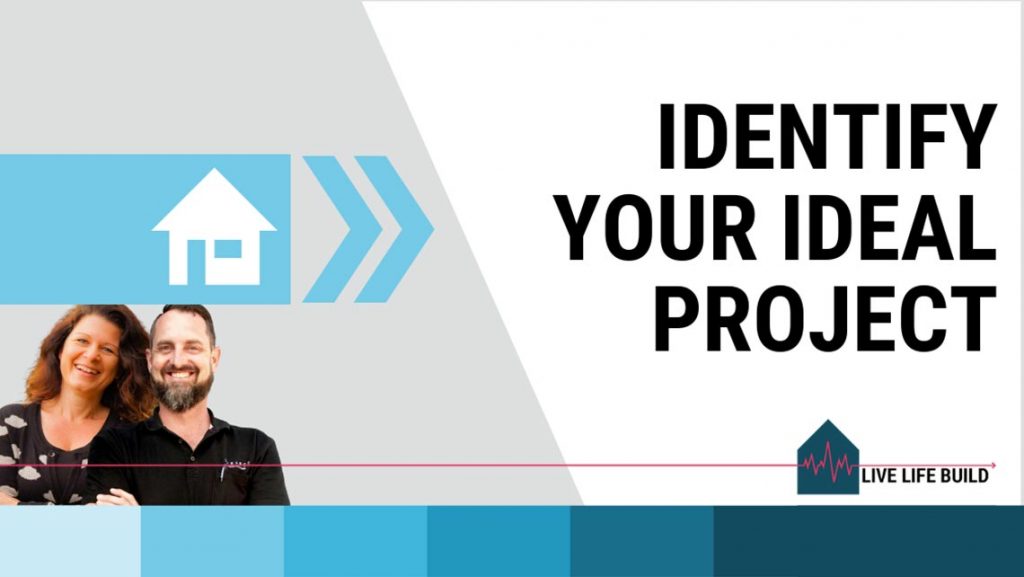Are you a builder who thinks it’s just not possible to choose your ideal projects and only work on those?
Do you believe you simply have to take any jobs offered to you, in order to keep paying the bills and ensure your business stays afloat?
It IS possible to choose the projects you want to work on. Projects that are profitable and that you enjoy doing (your ideal project). And build a business around only doing that type of work.
But you have to identify what your ideal project type is first!
In this blog post, we share some tips to help you identify what your ideal project could be.
Your existing business and projects provide fantastic insight if you only take the time to assess and review what they can tell you.
Use the following information as an exercise to audit your past and current projects, and ask yourself the necessary questions to identify your ideal project.
5. WHAT ARE YOU GOOD AT AND ENJOY
It makes sense to spend your days building projects that naturally enable you to excel at what you’re good at, and that are enjoyable to work on. And yet, so many builders don’t think about this when taking on work, and deciding the projects that they’ll seek out and bid on.
The projects you’re good at and enjoy may not necessarily all be one kind of project. This can often make it difficult for builders to figure out their ideal project, because what they enjoy can seem quite varied, and dependent on factors that may not be specific to the project type or size.
However, you may find a common thread runs through all your preferred projects. And if you can identify what that thread is, it can become a fantastic filtering factor that will help you define your ideal project.
And once you’re aware of what defines your ideal project, you can be much more proactive in your marketing and project assessment to identify what projects you’ll say yes to, and look for more of.
So, how can you identify your ideal project with this in mind? Well, a good place to start is this: spend some time reviewing the projects you’ve done in the past. Consider the following:
- What projects were more fun to do than others?
- Which projects had clients that were really great to work with, who respected and valued your work and expertise?
- If someone asked you which project was your favourite, what project is it, and why?
- If you’re working on new builds and renovations, which ones do you find more enjoyable to do? And why?
- Are there any materials or products you prefer to work with on a regular basis that ties together your preferred projects?
- What about site type or client type? Do you see any commonalities between your preferred projects in that regard?
- Which projects got you really excited and energised? Which ones had you jumping out of bed, and super excited to work on?
- And which projects do you still think of really proudly, and why?
- Is there a specific budget level or funding structure in the projects you prefer?
- And for those favourite projects, how did those clients find you? What made those projects happen?
If you have to work, you may as well enjoy it. That’s not to say it’ll be rainbows and unicorns every day. Every project is different, every client is different, and there’ll always be challenges. However, doing this analysis of the projects you’ve worked on could provide some insight into the common factors between projects that are more suited to you and your skills. And that are more enjoyable for you to work on as well.
Write down your thoughts and findings. See what that tells you about your ideal project.

4. DO YOU WANT TO WORK IN A SPECIFIC LOCATION?
Given that building new homes and renovations requires you to be in person at a specific location, it makes sense to determine your preference for the geographic location of your work.
You may feel that you live in a small area, so for you to have access to sufficient work you need to widen the net of where you’re willing to travel to, so that you can secure enough projects to make your business work overall.
Or, you may feel there’s so many builders serving your area, that you need to be willing to travel so you don’t have to deal with all the local competition.
There will be some truth to both those scenarios. However, once you’ve determined what your ideal project is and the commonalities that could help you shape how you seek out future work, you can get an understanding of how much of that work is available in your immediate locality.
Based on that, you can then assess how far you may need to travel to secure sufficient work to keep your business performing sustainably.
As an aside, we find many builders don’t know their numbers or true profitability, and so they’re taking on projects based on misinformation about how they think their financials work in their business. You may find that, once you know your numbers, you can actually be more profitable staying closer to home, and working on your ideal projects in a niched and focussed way.
Travelling long distances to manage and execute projects can be really taxing and time consuming.
It can mean you’re spending more time away from your home and family, which can put a strain on your relationships and well-being. It can mean you have less time to exercise or have downtime with your kids.
And depending on how far you have to travel, it can mean you need to create new supplier relationships, find new team members and navigate financially supporting additional car use, fuel costs, and other associated costs.
Having an ideal location you prefer to work in does not prevent you from taking projects outside of that region. It will, however, change the way you assess potential clients, project opportunities and where and how you may market your business as well.

3. TAKING ANY PROJECT BECAUSE IT PAYS THE BILLS
It can be incredibly difficult and scary to say ‘no’ to projects purely because they don’t fit your ‘ideal project type’. And in fact, that’s what prevents many builders from defining their ideal project, and shaping their business around those types of projects.
We knew of a builder who openly said he absolutely loved working on acreage homes. He found them so enjoyable to do. It was for a range of reasons.
Firstly, he loved the design work that could be achieved on a larger site, and the style and design of the homes overall.
He also loved the locations it meant he got to work in. It usually meant he was on sites with great views, in a natural environment that was enjoyable to be in every day, with fresh air and a great feel.
And, he loved the result they could create with the overall landscape design in combination with the home design. Creating fantastic, retreat-style acreage homes really gave him so much enjoyment. And he and his team were great at it too.
However, he found himself consistently taking on other types of projects. Spec homes, lower cost developer projects, and even renovation projects. He was nervous that if he didn’t say ‘yes’ to every project that came into their office, he wouldn’t keep the business afloat.
And herein lies the problem.
Once you get into the cycle of accepting all projects because you’re worried you won’t have enough money if you don’t, you’ll get caught up in delivering those projects. And you’ll become the builder who has a reputation for building those types of projects. Which means you’ll get offered more of those projects by those clients looking for a builder with that reputation.
It’s a never-ending cycle that is really hard to get out of. Unless you’re willing to start saying ‘no’ to projects that don’t fit with your ideal project, it’s not like you’ll magically get to start doing them if you’re saying ‘yes’ to anything that comes your way.
So, start saying no to the projects that don’t really fit what you want to be known for, or what you know you’re good at and enjoy doing.
Whilst this is scary, it’ll be amazing to see how it creates opportunities for you that are more in alignment with where you want your business to go.

2. WHO IS ON YOUR TEAM?
Part of building a thriving building business is creating a great team to help you deliver the projects you love doing.
And so, the skills, experience and expertise of your team becomes really important in setting you up well to do your ideal projects.
We’ve seen many builders have a business that’s grown quickly, and scramble to get extra people on board, and not think intentionally about whether those team members are a good fit for their ideal project goals.
When you build a team from a reactive place of simply dealing with the next spike in demand, you can again be creating a never-ending cycle that’s hard to get out of. And you’ll now have extra people you’re responsible for, and have to keep sustaining with projects – whether they’re projects you want to do or not.
Consider your ideal project.
- What type of team does it require to deliver?
- Who would you be surrounded by and helped by to make those ideal projects happen?
- Does that team include a person or people to help you find more of those ideal projects as well?
- Thinking like this, and planning it out, can be fantastic for ensuring you hire intentionally to support your business growth in the best possible direction.
What if you already have a team? How can you incorporate them and their skills as you grow your business to deliver more of your ideal projects?
Well: Perhaps your ideal project type is actually shaped by the team you have right now.
Perhaps you discovered in the analysis you did earlier, where we asked you a range of questions about the projects you’ve had and enjoyed, that your team was a big part of that. It could be that their skills and abilities are what contributed to projects being more successful and enjoyable overall.
Thinking about the team you have – or the team you want – and what that says about the ideal projects you do, can be a critical factor that provides great clarity for shaping your hiring, your team management and your overall delivery to support doing more of your ideal projects long-term.

1. HOW DOES PROFITABILITY FACTOR INTO YOUR IDEAL PROJECT?
If you’re like most builders we know, you can’t afford to be going out the back door in your business. Chances are you have a lot at stake personally in the financial performance of your projects and your business overall.
And so, your project profitability – and your business profitability overall – becomes a big part of the projects you choose and seek out.
We’ve seen some builders dismiss their ideal projects because they believe they’re simply not profitable to do.
They have a preconception that it’s not possible to make money AND do the projects they love.
However, in most cases, improving profitability isn’t about the project type itself. It’s usually more strongly related to your business systems and processes, the way you market your value to potential clients, the positioning of your business brand, the types of clients you attract, and the efficiency with which you run your projects and business overall.
So don’t dismiss your ideal project just because you think there’s no money in it. If Tiffany can sell a $1,500 paper clip, you can make your ideal project type a profitable one to deliver.
What about reviewing it from the other angle?
When you did the analysis of previous projects, did you find that some of your favourites were the ones that were more profitable overall? Are you already finding you naturally can deliver certain project types in a more streamlined, more successful way, that makes more profit for your business?
Of course, understanding this about yourself, your projects and your business, isn’t possible without doing an audit and review of the work you’ve done to date.
However, many builders run their businesses by always chasing the next job, and not leaving themselves any time to review and analyse what went well, what didn’t, what they want to do more of, and what they should do less of (or never do again!)
Take the time to analyse the information you already have in your business to help you shape the best direction forward.
Otherwise, you’ll be running on a path you can never be sure is taking you where you want to go.
Or worse, you’ll be digging yourself a hole you can’t get yourself out of.
Use this blog post to assess for yourself: what is your ideal project?
And how can you then set things up to find more of those projects so you can enjoy the work you do every day.

So, here’s our 5, 4, 3, 2, 1 to identify your ideal project.
5. Have you asked your team what their goals are?
4. How can you help and facilitate your team’s goals?
3. What are your goals as a team?
2. Holding people accountable.
1. Celebrate the wins and create a good work environment.
Live Life Build’s 6P Methodology unlocks the 6 ways to elevate your building business:
PERSONAL | PROJECTS | PEOPLE | PARTNERSHIPS | PROCESSES | PROFESSIONAL
Want to learn how to be a better business owner? Learn the systems, marketing tools, mindset and business skills you need in our group program and mastermind, ELEVATE. Learn more here.

